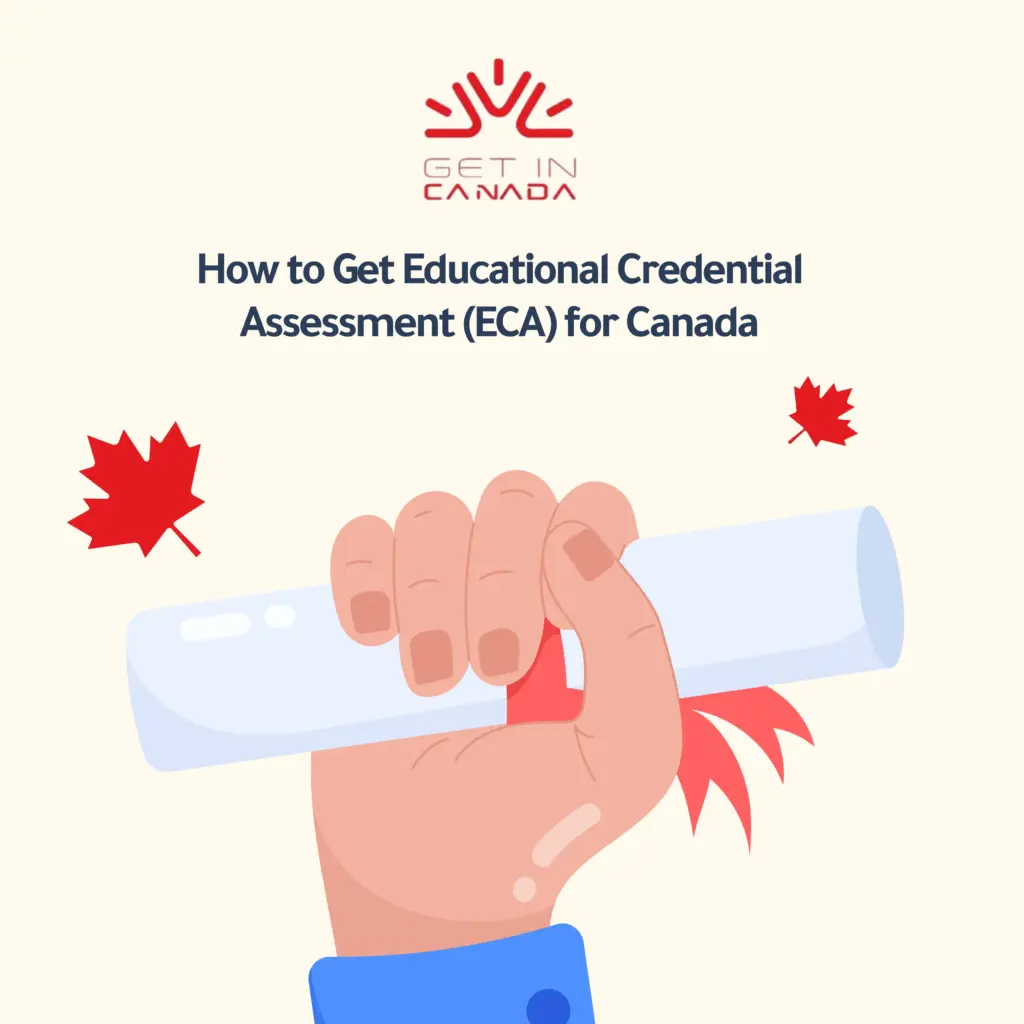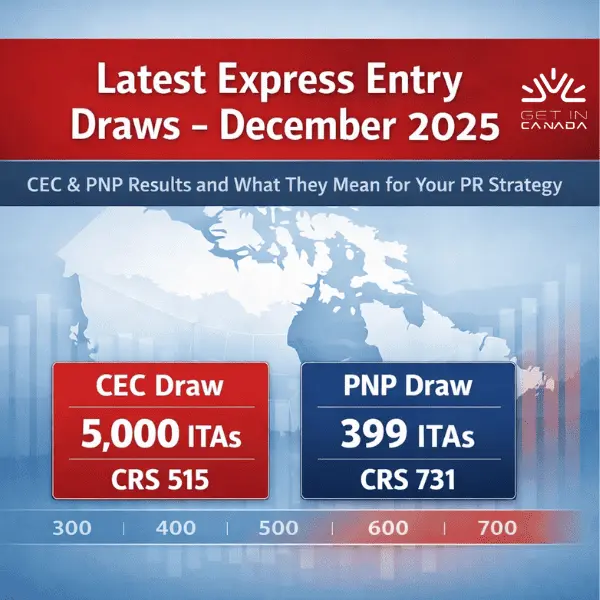How to Get Educational Credential Assessment (ECA) for Canada
Planning to immigrate to Canada in 2025? One of the first steps is completing your educational credential assessment in Canada. This evaluation confirms that your foreign education; whether a degree, diploma, or certificate; is equivalent to a Canadian credential. Without it, you cannot claim education points in Express Entry, Provincial Nominee Programs (PNP), or the Atlantic Immigration Program (AIP).
This guide for Get in Canada will walk you through the full ECA process, including fees, timelines, and tips for faster results, to help you start your Canadian journey confidently.

1. What is an Educational Credential Assessment (ECA)?
An Educational Credential Assessment (ECA) is a report issued by a recognized organization in Canada that verifies:
- Your foreign education is authentic and valid
- Its Canadian equivalency level (Bachelor’s, Master’s, Diploma)
- Eligibility to claim Comprehensive Ranking System (CRS) points in Express Entry
Who Needs an ECA?
- Federal Skilled Worker Program applicants
- Candidates for PNP or AIP streams requiring foreign education verification
- Skilled professionals looking to improve Express Entry scores
If you completed your studies in Canada, you don’t need an ECA for Canadian degrees.
2. Step 1: Understand ECA Types
Before starting your educational credential assessment in Canada, it’s important to know which type of ECA you need. The wrong type may delay your immigration process or make your report invalid for IRCC.
Types of ECA
| Type of ECA | Use Case |
|---|---|
| General ECA | For employment or academic purposes in Canada |
| Immigration ECA | Mandatory for IRCC immigration applications |
Why Choosing the Right Type Matters
Selecting the correct ECA ensures IRCC will accept your report and allow you to claim Comprehensive Ranking System (CRS) points. Immigration ECAs are valid for five years, so they can be used across multiple applications.
Tip: Only Immigration ECAs from IRCC‑approved organizations are valid for Express Entry and AIP.
Find out if you are eligible to get in Canada
3. Step 2: Select an IRCC‑Approved Organization
Canada only accepts Educational Credential Assessments (ECAs) from IRCC‑designated organizations. Choosing the right one affects processing speed, fees, and recognition for immigration.
IRCC‑Designated Organizations
- World Education Services (WES)
- Comparative Education Service (CES, University of Toronto)
- International Credential Evaluation Service (ICES)
- International Qualifications Assessment Service (IQAS)
- International Credential Assessment Service of Canada (ICAS)
Special Cases
- Doctors: Must apply to the Medical Council of Canada (MCC)
- Pharmacists: Must use the Pharmacy Examining Board of Canada (PEBC)
Tip: If speed is your priority, WES is the fastest. If your credential may get downgraded by WES, consider CES or ICAS for better equivalency results.
4. Step 3: Prepare and Submit Your Documents
Proper documentation is the key to a smooth educational credential assessment in Canada. Each IRCC‑approved organization has specific requirements, but most ask for the following:
Required Documents
- Degree, diploma, or certificate copies
- Official transcripts sent directly by your school/university
- Valid government ID (passport)
- Certified translations if documents are not in English or French
Tips for Smooth Submission
- Request transcripts early; university delays are the most common reason for slow processing
- Use electronic transcript delivery whenever possible to save weeks
- Ensure your name and birthdate match across all documents to prevent verification issues
- Track your document delivery and confirm receipt through your ECA provider’s portal
Pro Tip: Incomplete or mismatched documents are the number one reason for ECA delays; double‑check everything before submission.
5. Step 4: Pay the ECA Fees
After submitting your documents, you must pay the educational credential assessment Canada fees to start the evaluation. Fees vary depending on the IRCC‑approved organization and delivery method.
Current 2025 fees and timelines:
| Organization | Approx. Fee (CAD) | Processing Time |
|---|---|---|
| WES | $240–$250 | 4–8 weeks |
| ICAS | $210 | 12–14 weeks |
| CES | $230 | 12–14 weeks |
| IQAS | $220 | 15–20 weeks |
| ICES | $230 | 14–16 weeks |
Payment tips:
- Fees are non‑refundable even if your application is refused or canceled.
- Additional credentials or report copies may require extra charges.
- Opt for courier delivery to receive your ECA faster and track your documents.
- Ensure your payment method works internationally to avoid processing delays.
Tip: WES is usually the fastest and cost‑effective option if you need your ECA urgently.
Find out if you are eligible to get in Canada
6. Step 5: Receive and Use Your ECA Report
After your application is processed, you’ll get your Educational Credential Assessment (ECA) report, which is valid for five years.
What your ECA report shows:
- Verification that your credential is authentic
- Its Canadian equivalency (e.g., Bachelor’s, Master’s, Diploma)
- A unique reference number for your immigration profile
How to use it:
- Enter the ECA reference number in your Express Entry or PNP profile to claim CRS points.
- Keep both digital and hard copies for provincial or IRCC requests.
- If the equivalency is lower than expected, you may consider another ECA with a different organization.
Tip: Without this report, your foreign education will not count toward immigration points.
7. Tips for a Faster ECA
Delays in receiving your Educational Credential Assessment (ECA) can affect your immigration timeline. Use these strategies to speed up the process:
- Choose the fastest organization: WES typically processes ECAs in 4–8 weeks, while others like IQAS or ICES may take 12–20 weeks.
- Submit complete documents early: Request transcripts from your university as soon as possible and ensure they are sent directly to your selected ECA organization.
- Use electronic delivery where possible: Many institutions and WES accept secure digital transcripts, which saves weeks compared to international mail.
- Double‑check names and details: Ensure that your name, date of birth, and credential information match across all documents to prevent verification delays.
- Pay for courier delivery: Standard mail can add weeks to the process. Opting for a courier ensures faster and trackable delivery of your report.
- Monitor your application status: Log in to your ECA portal regularly and respond quickly to any document requests or verification issues.
Pro Tip: Start your ECA process before creating your Express Entry profile to avoid last‑minute delays in CRS point calculation.
Conclusion:
Completing your educational credential assessment in Canada is the foundation of a successful immigration process. With the right preparation, accurate documents, and early application, you can avoid delays and maximize your chances of success in Express Entry or Provincial Nominee Programs.
For more Canadian visa inquiries? Click here to start the process with our help →
FAQs about How to get education credentials assessed for Canada
1. How to get educational credential assessment for Canada?
You need to choose an IRCC‑approved organization like WES, CES, or IQAS, submit your official transcripts and required documents, pay the ECA fees, and wait for your report. Once issued, use the reference number to claim CRS points in Express Entry or other immigration programs.
2. How do I evaluate my credentials in Canada?
You must obtain an Educational Credential Assessment (ECA) from an IRCC‑designated organization. They will verify the authenticity of your foreign degree, diploma, or certificate and determine its Canadian equivalency.
3. What is the fastest education credential assessment (ECA) in Canada?
WES is usually the fastest, completing most assessments in 4–8 weeks once all documents are received and verified. Choosing electronic transcript delivery and courier return speeds up the process.
4. How long is an ECA report valid in Canada?
An ECA report is valid for five years from the date of issue. During this time, you can use the same report for multiple Express Entry or PNP applications.
5. Can I submit more than one ECA for better results?
Yes, if your first ECA results in a lower equivalency than expected, you can apply to another organization, such as CES or ICAS, to potentially receive a higher equivalency and increase your CRS score.











